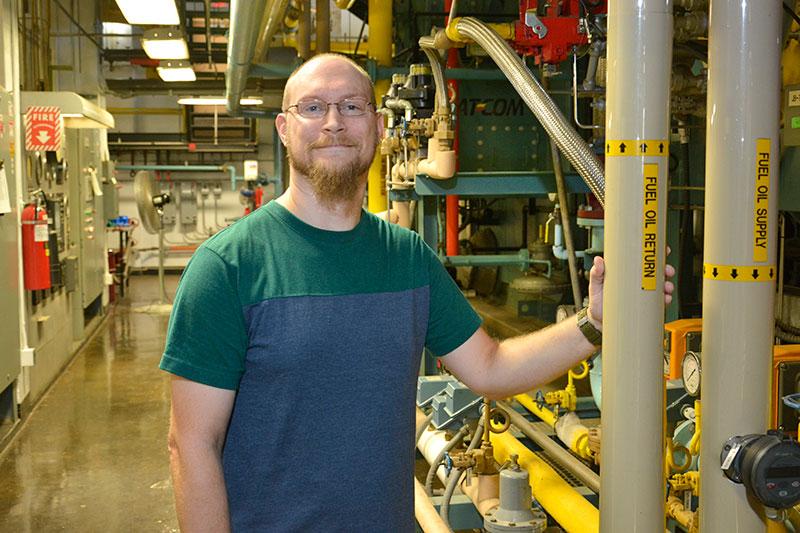College's boiler room steams along on 'working together,' Roy Ayotte says
In this issue’s Spotlight, meet Roy Ayotte, a plant utilities engineer in the Central Heating Plant in Lee Hall, working with the boilers there and around campus that supply steam for heat and hot water.
Q. Where were you born and raised?
A. I was born in Warren, Ohio. I was raised in New York; my family is from the Troy-Albany area. I went halfway through high school in Pulaski and finished up in Altmar-Parish-Williamstown.
Q. When did you start working at SUNY Oswego?
A. I’ve worked here 22 years. I got hired as a janitor. I thought I might start going to college — I was a graphic art major in high school. In the summer of 1995, I bid for building trades, then about a month later, I got an interview for the boiler room. I really liked how everyone worked together in the boiler room. It was like a family. We worked well as a team.
Q. Are you a manager in the Central Heating Plant?
A. As a plant utilities engineer, I’m a working supervisor. The job an assistant engineer does is the same job. I have the responsibility as a supervisor, and if something bad happens, I’m the one who’s held accountable. I’m not trying to downplay my job or up-play it: We work together.
Q. Can you describe your duties?
A. We maintain all the boilers on campus: four big boilers at Central Heating Plant and 13 boilers around campus. We supply steam to campus, all the buildings. Without the boilers, the students wouldn’t have heat or hot water. We maintain the steam lines and all the equipment in the main boiler room. We do boiler and (swimming) pool chemistry. We take care of all the dispatch calls after 4 o’clock and on the weekends, because we’re here 24x7. We dispatch employees accordingly: If someone wants a plumber or electrician, we do our best to get those people. We’re the ones who call maintenance, and they’re on all shifts now. We do work in pits—you’ve seen manhole covers around campus (for steam lines). In summer, we have the opportunity to work on equipment and have shutdowns. We take the boilers apart. Once a year, the boilers need an interior and an exterior inspection, and state inspectors check them and safeties on the boilers. If there’s any piping to be done, we do that. We always get compliments. Inspectors and people from other facilities come in, and our place is very clean.
Q. What kind of shifts do you work in the boiler room?
A. We have fixed shifts, though they overlap so we’re always covered. My shift is Sunday to Thursday, 7 a.m. to 3 p.m.
Q. Do you ever get called in off-shift?
A. If there’s emergencies, yes, but it’s not like it used to be, because of all the newer steam lines around campus. With the newer piping, newer technology, we don’t have the problems we used to.
Q. It’s hot down in the boiler room, but you seem to love your job.
A. It’s a cool day downstairs—90 degrees! We don’t really get seen much. It’s good that we aren’t seen and still get to do our work. It’s really a good job. After 20 years, it’s still fun, it really is! The little things when something breaks? It just adds to the job—it makes it fun. I’m part of something here. We have our differences—you get that with any job. But we do have people who will bend over backwards to get something done, who will put forth 110 percent.
Q. Can you think of a time you were extra pleased with the team’s effort?
A. Some years back, we had a gasket blow out on a header valve. Steam was shooting out. We got the call about 2 a.m. We were lucky that it was in the summer. We got in, turned the boilers off, started unbolting the valve. … We put a new gasket in and put the system back online. You have to be safe, but you also have to work with high temperatures—that’s why you have to have gloves. Everybody worked together. When we get a job done, I’m happy that we got the job done. Whether we have a scheduled or unscheduled outage, we work hard to get the job done.
Q. Do you serve on any campus committees?
A. I’m on the Safety Committee. We meet every other Thursday and go over safety issues. Right now, every Tuesday, there’s a small group that goes around from the Safety Committee that looks at confined spaces, defines what a confined space is, in each building—that requires additional safety procedures. I was also on a subcommittee for the elevators.
Q. What do you like to do off the job?
A. I like fishing, mountain bike riding, camping, going to the falls in Ithaca. We go to Texas for a couple of weeks a year to visit family. Hobbies? Yes, drawing—I like art. I take care of my mother in law’s horse, and I like riding. My wife, Casey, and I love to do things with our 5-year-old daughter, Whitney. What I used to do and what I do now has changed. (Laughs.) I collect rocks—minerals, crystals. My wife and I collect Fenton art glass (handmade blown and pressed glass). I have some military rifles and some bayonets—I have lots of weird little stuff. My wife and I are renovating our old farmhouse.




